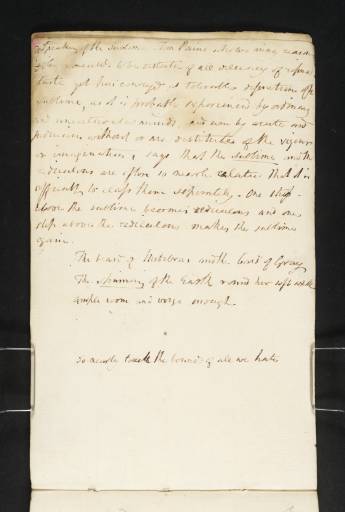Joseph Mallord William Turner Notes on the Sublime, and Verses (Inscriptions by Turner) 1809
Joseph Mallord William Turner,
Notes on the Sublime, and Verses (Inscriptions by Turner)
1809
Joseph Mallord William Turner 1775–1851
Folio 1 Verso:
Notes on the Sublime, and Verses (Inscriptions by Turner) 1809
D07539
Turner Bequest CX 1a
Turner Bequest CX 1a
Inscribed by Turner in ink (see main catalogue entry) on white laid paper, 185 x 116 mm
Accepted by the nation as part of the Turner Bequest 1856
References
1909
A.J. Finberg, A Complete Inventory of the Drawings of the Turner Bequest, London 1909, vol.I, p.293, CX 1a.
1990
Andrew Wilton and Rosalind Mallord Turner, Painting and Poetry: Turner’s ‘Verse Book’ and his Work of 1804–1812, exhibition catalogue, Tate Gallery, London 1990, p.136.
1997
Anthony Bailey, Standing in the Sun: A Life of J.M.W. Turner, London 1997, p.160.
.
Turner’s inscription reads:.
Speaking of the sublime Tom Paine who we may reason | ably conclude to be destitute of all delicacy of refined | taste yet has conveyed a tolerable definition of the | sublime, as it is probably experienced by ordinary | and uncultivated minds, and even by acute and | judicious without or are destitute of the vigour | or imagination, says that the sublime and the | ridiculous are often so nearly related that it is | difficult to class them separately. One step | above the sublime becomes ridiculous and one | step above the ridiculous makes the sublime | again. |
The beard of Hudibras and the bard of Gray
The spinning of the Earth round her soft axle
Ample room and verge enough
The beard of Hudibras and the bard of Gray
The spinning of the Earth round her soft axle
Ample room and verge enough
So nearly touch the bounds of all we hate
These notes comment on Thomas Paine’s remarks on the proximity of the Sublime to the ridiculous, in his Age of Reason, part 2 (1793). As Matthew Imms has discovered, they are based on a short article in The Monthly Mirror, August 1804, contributed by ‘Q.Z’, otherwise Mrs. Blore.1 A very similar version was later to appear in Izaak Disraeli’s Curiosities of Literature, presumably culled from the same source. Turner’s wording is only slightly different. In the 1804 version, Paine is introduced as a ‘very vulgar and mischievous, but acute genius’, in a lofty and superior tone reflecting views current in Tory and conservative quarters as a result of Paine’s connections with the American and French revolutions.
The lines of verse are Turner’s own composition but are also inspired by ‘Q.Z’, who gives as examples of the ridiculous and the Sublime respectively two famous poems, Samuel Butler’s Hudibras (1661) and Thomas Gray’s The Bard (1757). Citing Gray’s ‘image of his Bard, “Loose his beard and hoary hair, streamed like a meteor to the troubled air”’, the 1804 article goes on to say that ‘it is, however, remarkable, and somewhat ludicrous, that the beard of Hudibras is compared to a meteor, and the accompanying observation almost induces me to think Gray derived from it the plan of that sublime ode; since his bard precisely performs what the beard of Hudibras denounced’. Aside from her reflections on poetic ‘imitations and similarities’, the author’s point, and Turner’s, is that either the ridiculous or the Sublime can be exaggerated to the point that it risks turning into the other: ‘let us recollect, that the burlesque and the sublime are extremes, and that extremes meet. How often does it merely depend on our own state of mind, and on our own taste, to consider the sublime as burlesque!’ For Turner the same considerations apply to pictorial expression, and on folios 43 verso–45 verso of the sketchbook he writes at length on the relationship between painting and poetry (D07587–D07591).
David Blayney Brown
August 2009
‘Q.Z.’, ‘Gray the Poet’, The Monthly Mirror: Reflecting Men and Manners with Strictures on their Epitome, The Stage, August 1804, pp.79–80. For ‘Mrs Blore, a noted female writer, under the signature of Q.Z’..., see Henry Kirke White to his brother Neville, April 1801, The Remains of Henry Kirke White, of Nottingham, Late of St John’s College, Cambridge; with an Account of his Life, by Robert Southey, London 1813, vol. I, p.7.
How to cite
David Blayney Brown, ‘Notes on the Sublime, and Verses (Inscriptions by Turner) 1809 by Joseph Mallord William Turner’, catalogue entry, August 2009, in David Blayney Brown (ed.), J.M.W. Turner: Sketchbooks, Drawings and Watercolours, Tate Research Publication, December 2012, https://www

